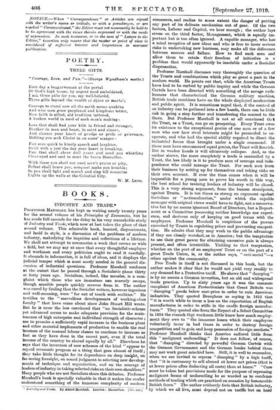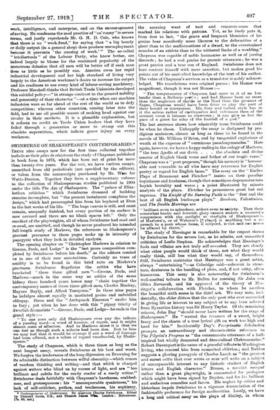BOOKS.
INDUSTRY AND TRADE.•
PROFESSOR MAPS'S ALT has kept us waiting nearly twenty years for the second volume of his Principles of Economics, but he has made full amends for the delay in his very remarkable study of Industry and Trade,which now at last takes the place of that second volume. This admirable book, learned, dispassionate, and lucid in style, is a discussion of the problems of modern• industry, embodying the inquiries and reflections of a lifetime. We shall not attempt to summarize a work that covers so wide a field, but we may say at once that every thoughtful employer and workman and every politician ought to read it carefully. ft abounds in information, it is full of ideas, and it displays the judicial temper whioh is most sorely needed in the general dis- cussion of industrial questions. Professor Marshall confesses at the outset that he passed through a Socialistic phase thirty or forty years ago. Socialism, indeed, like measles, is a com- plaint which those who are immature can scarcely escape, though sensible people quickly recover from it. The author was cured by finding that the Socialist writers, however ingenious and well-meaning, were " far out of touch with realities?' He testifies to the " marvellous developments of working-class faculty " that have come about since John Stuart Mill wrote. But he is none the less convinced that "no Socialistic scheme yet advanced seems to make adequate provision for the main- tenance of high enterprise and individual strength of character ; nor to promise a sufficiently rapid increase in the business plant and other material implements of production to enable the real Incomes of the manual labour classes to continue to increase as fast as they have done in the recent past, even if the total Income of the country be shared equally by all." Elsewhere he Bays that the inventors of new schemes of the kind "appear to regard economic progress as a thing that goes almost of itself ; they take little thought for its dependence on deep insight, on far-seeing foresight, on sound judgment in selecting new develop- ments of technique and organization, and on the ()enrage of leaders of industry in taking• selected risks on their own shoulders." Many people who are not Socialists share this delusion. Professor Marshall's book is specially valuable in that it makes the reader understand something of the immense complexity of modern Indust:wand Trade. By Alfred Marshall. London : Macmillan. [18s. net.]
commerce, and realize to some extent the danger of putting any part of its delicate mechanism out of gear. Of the two factors, Labour and Capital, we hear enough ; the author lays stress on the third factor, Management, which is equally im- portant but is too often ignored. A capable manager, who has a mind receptive of pew ideas and who is free to incur serious risks in undertaking new business, may make all the difference between success and failure. How to find moll men and allow them to retain their freedom of initiative is a problem that would apparently be insoluble under a Socialist dispensation.
Professor Marshall discusses very thoroughly the question of the Trusts and combinations which play so great a part in the modern world. He points out that, while the American Trusts have had to be curbed by public inquiry and while the German Cartels have been directed with something of the savage ruth- lessness that characterized the German military machine, British trade combines have on the whole displayed moderation and public spirit. It is sometimes urged that, if the control of an industry can be gathered into a few hands, there can be little risk in going a step further and transferring the control to the State. But Professor Marshall is not at all convinced thrt the Trust, as a Trust, can go on prospering. Every Trust owes its existence to the exceptional genius of one man or of a few men who saw how rival interests might be persuaded to co- operate, and who had the special ability required to direct the industrial forces thus brought under a single command. If those men have succeesorsof equal genius, the Trust will flourish. But in weaker hands it will ultimately collapse. And, as the author shows, the more completely a trade is controlled by a Trust, the less likely is it to produce men of courage and inde- pendence who could manage the Trust. For such men learn their business by setting up for themselves and taking risks on their own account. If ever the time conies when it will be impossible for a young man to prove his worth in this way, the best school for training leaders of industry will be closed. This is a very strong argument, from the human standpoint, against Trusts. It is ten times as strong an argument against Socialism or "nationalization," under which the capable manager with original views would have to fight, not a conserva- tive but by no means ignorant Board of Directors, but a Depart- ment or a Committee possessing neither knowledge nor experi- ence, and desirous only of keeping on good terms with the employees. Professor Marshall is suspicious of the powers exercised by Trusts in regulating prices and preventing competi- tion. He admits that they may work to the publio advantage if they are closely watched, as in America; but the temptation to use their great power for obtaining excessive gain is always present, and often irresistible. Yielding to that temptation, whether on the part of an employers' Trust or on the part of a great Trade Union, is, as the author says, " anti-social "—a crime against the community.
Free Trade in itself is not discussed in this book, but the author makes it clear that he would not yield very readily to any demand for a Protective tariff. He shows that " dumping " is by no means a German invention, but an old and widespread trade practice. Up to sixty years ago it was the common complaint of American Protectionists that Great Britain was " dumping " goods below cost-price in order to ruin American industries. They quoted Brougham as saying in 1815 that " it is worth while to incur a toss on the exportation of English manufactures in order to stifle in the cradle foreign manufac- tures." They quoted also from the Report of a Select Committee in 1854 the remark thtt workmen little know how much employ- ment they owe to " the immense losses which their employers voluntarily incur in bad times in order to destroy foreign competition and to gain and keep possession of foreign markets." Professor Marshall thinks that America suffered little from this " malignant underselling." It does not follow, of course, that " dumping " directed by powerful German Cartels with the German Government and the German banks behind them may not work great mischief here. Still, it is well to remember, when we are invited to repress " dumping " by a high tariff, that " it is customary to sell abroad at lower net prices (that is at lower prices after deducting all costs) than at home." "Care must be taken lest provisions made for the purpose of repressing malignant forms of underselling be so worded as to condemn methods of trading whioh are practised on occasion by honourable British firms." The author evidently feels that British industry, by which we all live, must depend not on tariffs but on hard
work, intelligence, and enterprise, and on the encouragement of saving. He condemns the mad practice of "ca' canny " in severe terms, and justly reprehends Mr. G. H. D. Cole, who knows that there is no " work-fund," for saying that " a big hourly or daily output (in a general shop) does produce unemployment because it prevents the nursing of work.' " The so-called " intellectuals " of the Labour Party, who know better, are indeed largely to blame for the continued popularity of the monstrous delusion that all men will be better off if each man does as little as he possibly can. America owes her rapid industrial development and her high standard of living very largely to the American workman's desire to increase his output and his readiness to use every kind of labour-saving machinery. Professor Marshall thinks that British Trade Unionists developed this suicidal policy—" in strange contrast to the general nobility and generosity of their character "—at a time when our machine industries were so far ahead of the rest of the world as to defy competition; whereas other countries, coming later into the field, had to use all possible means of making head against our rivalry in their markets. It is a plausible explanation, but it reflects no credit on Trade Union leaders that they have failed through a generation or more to stamp out this obsolete superstition, which inflicts grave injury on every workman.



































 Previous page
Previous page